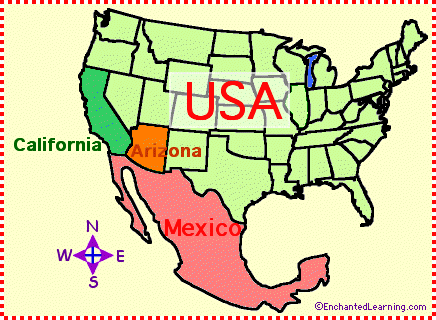Chavez founded a group that advocates for the rights of farm workers, acting to increase wages and improve the working conditions and safety of farm workers. He also organized strikes (when workers refuse to work until improved working conditions and salary demands are met) and nation-wide boycotts of agricultural products in order to help workers (a boycott is a protest in which the public is asked not to buy certain products). Chavez went on many hunger strikes, refusing to eat until violence against strikers ended and until legislators (law makers) voted to make laws improving the lives of farm workers. He was also jailed many times during his fight against terrible migrant worker conditions.
Early Life:
 Chavez was born in San Luis, Arizona, near Yuma. His family had lived there since his grandfather immigrated from Mexico.
Chavez was born in San Luis, Arizona, near Yuma. His family had lived there since his grandfather immigrated from Mexico.
His parents, Librado and Juana, owned a farm and store. The family lost the farm when Cesar was 10 years old (during the Great Depression), and became migrant farm workers. As a youth, Cesar worked part-time in the farm fields with his family in Arizona and California as they moved from farm to farm, harvesting the fields.
After graduating from 8th grade, Cesar started working full-time in the fields to help support his family (this was necessary because his father, Librado, had been injured in a car accident).
Cesar served in the US Navy during World War 2. When Cesar Chavez returned from the war, he labored as a farm worker in California. Chavez married Helen Fabela in 1948; they eventually had 8 children and 31 grandchildren.
Early Social Activism - Sí, Se Puede (Yes, it can be done):
Chavez and his wife taught Mexican immigrants to read and organized voting registration drives for new US citizens. Chavez was greatly influenced by the peaceful philosophy of St. Francis of Assisi and Mohandas Gandhi. He joined the Community Service Organization, an organization that worked for the rights of farm workers.
Starting a Union, Organizing Strikes and Boycotts - La Huelga (The Strike):
In 1962, Cesar Chavez, Dolores Huerta and Gilbert Padilla started a union (a workers' rights group), called the National Farm Workers Association(NFWA), to fight for "La Causa" (Spanish for "The Cause"). The NFWA organized "huelgas" (the Spanish word for "strikes"). There were many bitter and violent fights between the grape growers and the workers; Chavez and many union people were jailed in the struggle. Some agreements were eventually made between the farm workers union and the growers. In order to force growers to further improve farm worker conditions, Chavez organized a nation-wide lettuce boycott.
In 1968, Chavez organized a five-year "grape boycott," a movement that urged people to stop buying California grapes until farm workers had contracts insuring better pay and safer working conditions. The name of the union was changed to the United Farm Workers (the UFW) in 1974. In 1978, when some of the workers' demands were met, the boycotts of lettuce and grapes were lifted.
A Lifetime Quest for Social Justice - Viva La Causa (Long Live The Cause):
Chavez's motto was "Si, se puede" (meaning "Yes, it can be done") and he proved it to be true. His work for the fair treatment of farm workers changed the lives of millions of people for the better.
After a lifetime of valiantly working for social justice, Chavez died of natural causes at the age of 66 (in 1993). In 1994, Chavez was awarded the Presidential Medal of Freedom posthumously (after his death). To this day, the UFW and Chavez's children and grandchildren continue his fight for social justice.